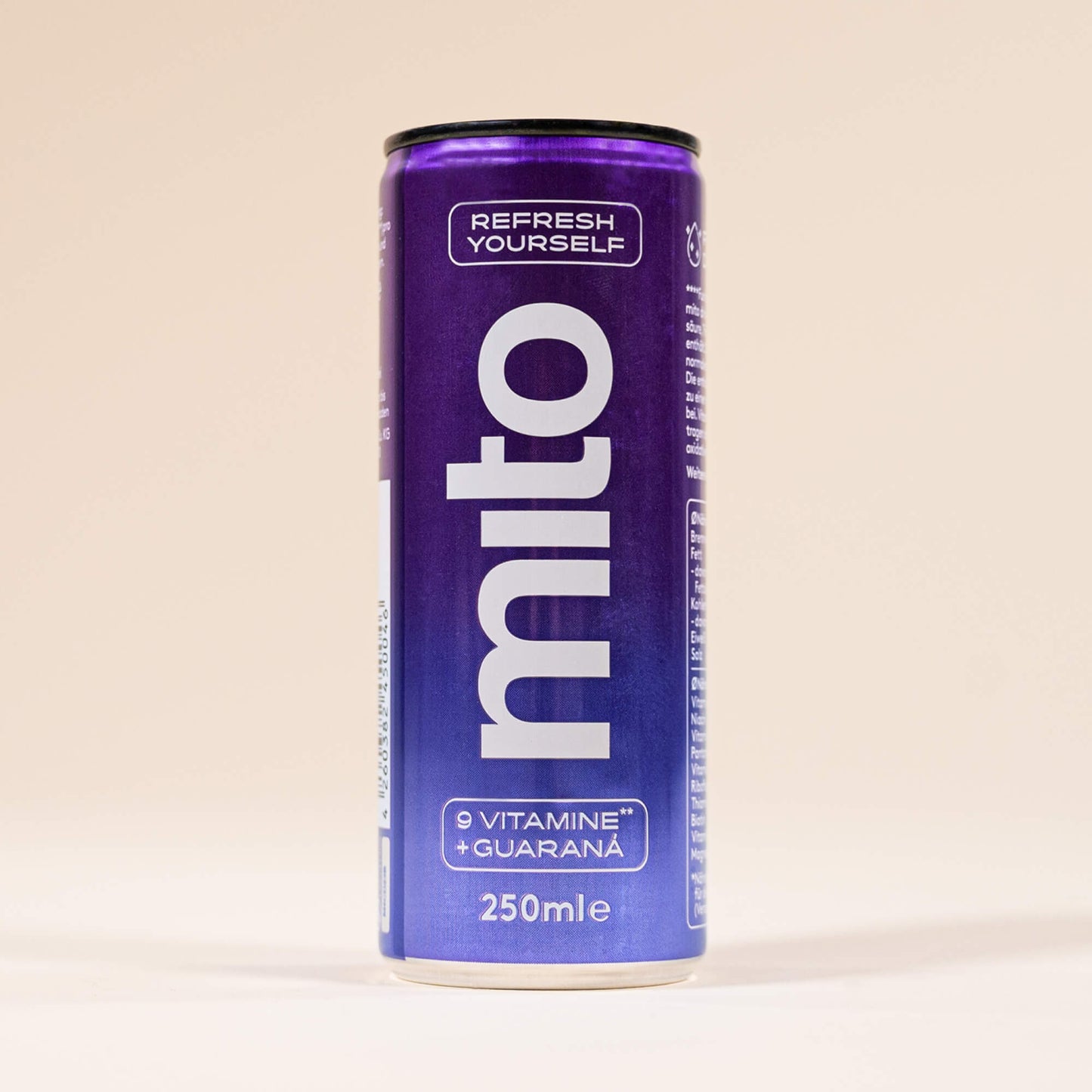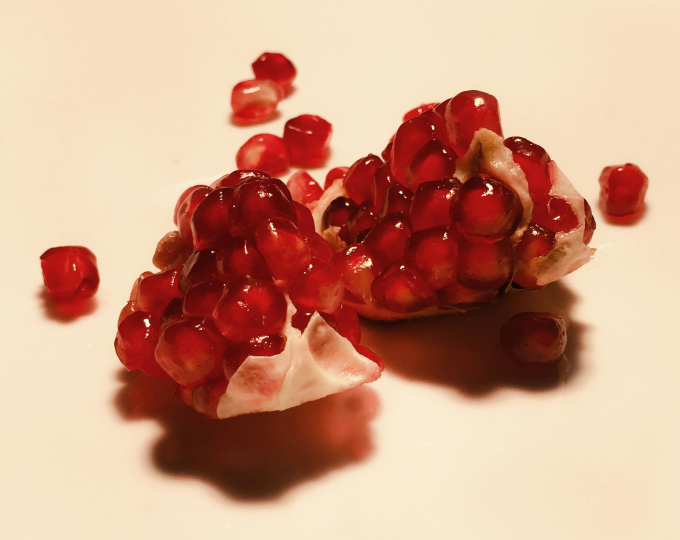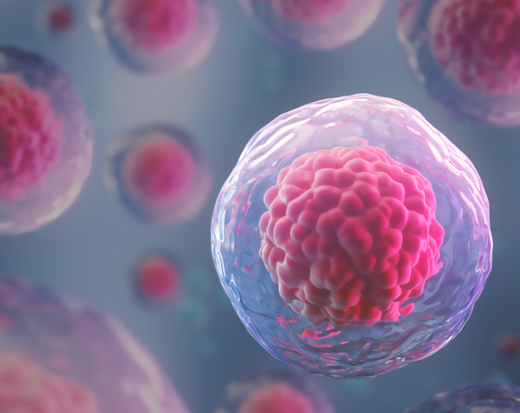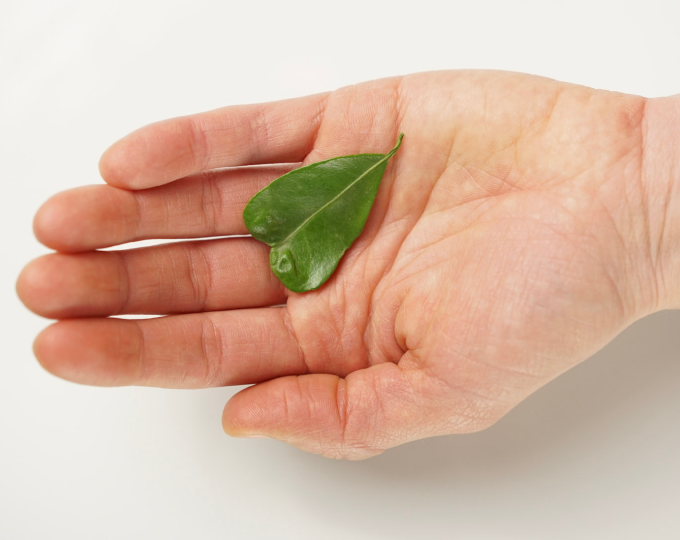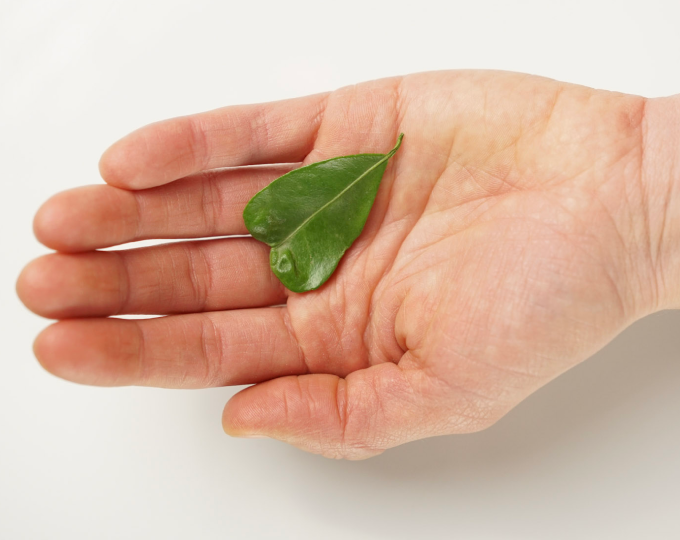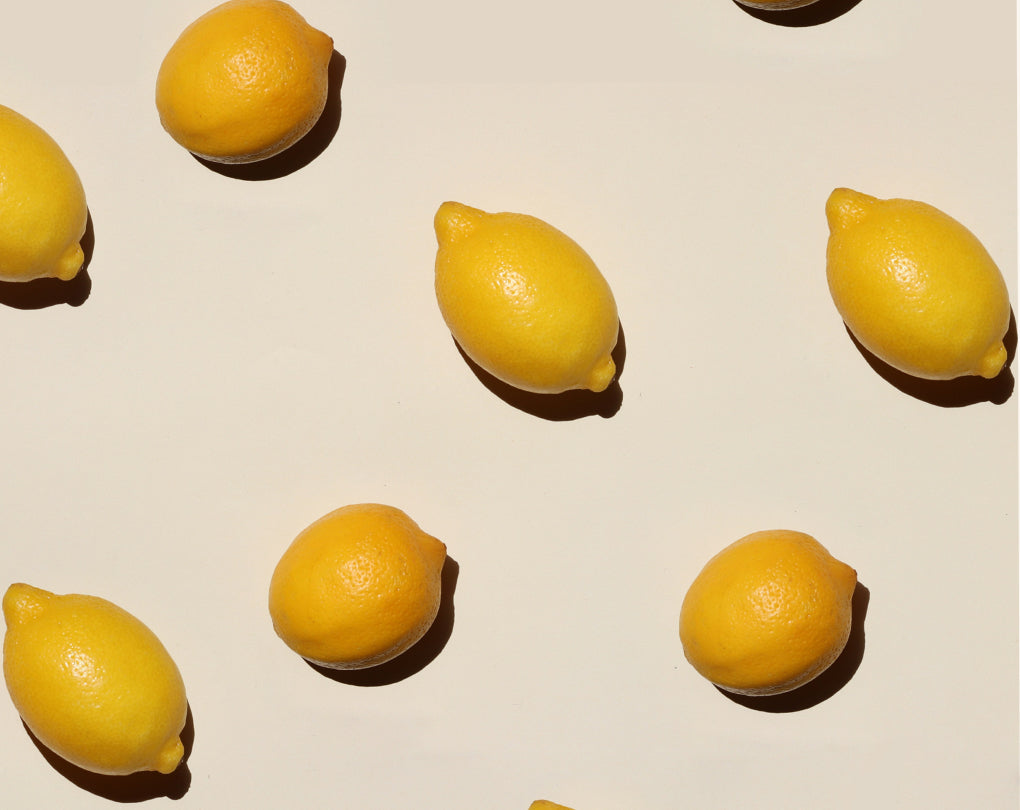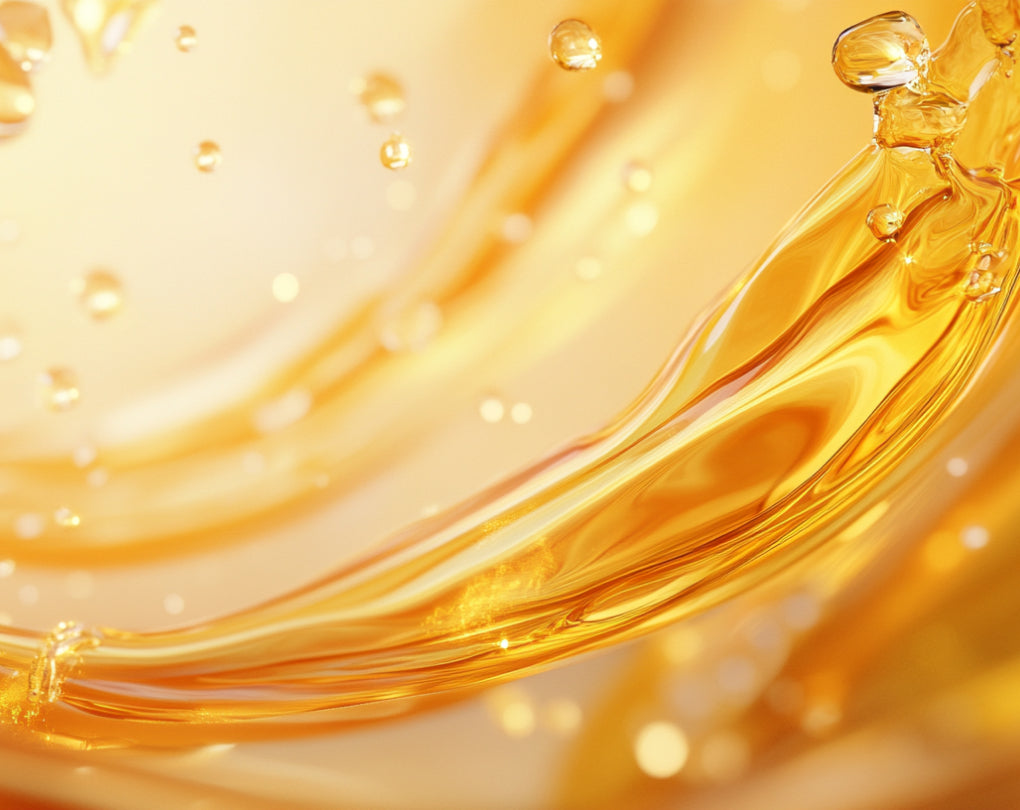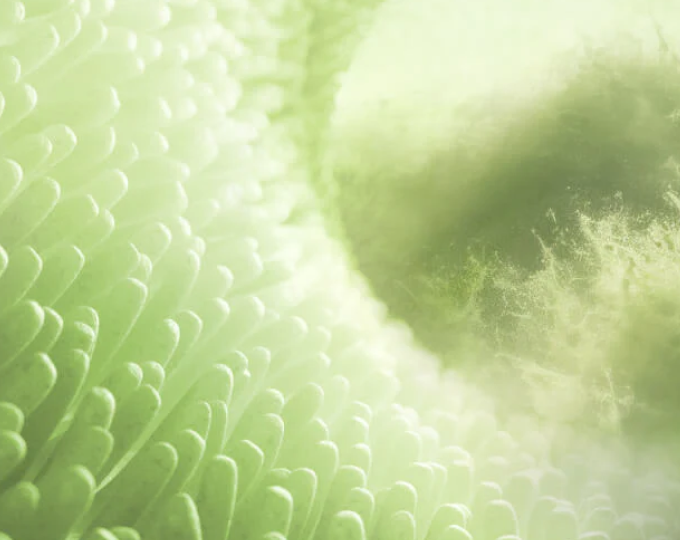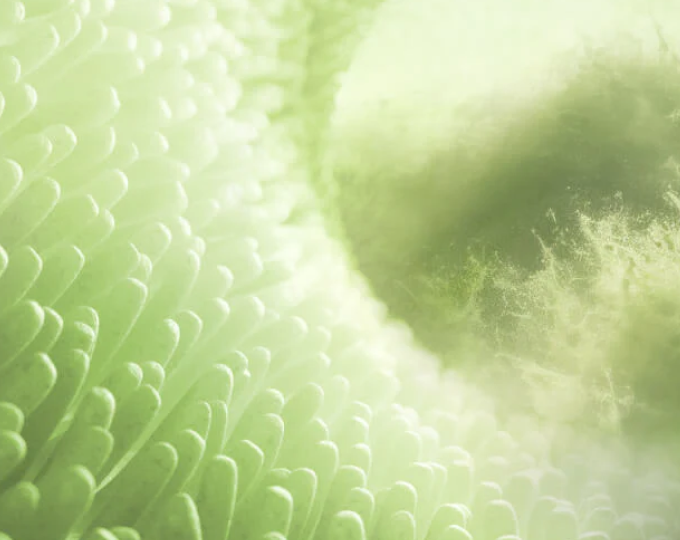Themen dieses Blogartikels:
Inhaltsverzeichnis
- Introduction: Give yawns no chance
- Energy pathways of the body: Where does the energy for everyday life come from?
- What gives you energy when you're tired?
- 1. Awakened: Cold shower as a wake-up call
- 2. Power Breathing: Breathing Techniques for More Strength: Wim Hof Breathing, Box Breathing & Nadi Shodhana
- 3. L-theanine & matcha instead of coffee & energy drinks
- 4. Psychological Aspects: Tips Against Mental Exhaustion
- 5. Music: Dance away your tiredness
- 6. Light & Hormones: How Sunlight Fuels You
- 7. Power Posing: Posture & Movement for More Energy
- 8. Mini Nutrition Hacks: Vitamins, Nutrients & Phytonutrients
- 9. Fluid: Gets you back into the flow
- 10. Restful sleep as prevention
- Sources & Bibliography
Einleitung
Give yawns no chance: Naturally fit from morning till night
Especially around the turn of the year, many people feel as if their energy reserves are depleted. No wonder: energy boosters like a varied diet, exercise in the fresh air, and soaking up the sun are more difficult to find in winter than in summer.
In this article, we'll introduce you to practical power boosts that will keep you energized from morning till night. You'll also learn how vitamins and micronutrients naturally recharge your daily batteries and help you get through that midday slump.
Energy pathways of the body: Where does the energy for everyday life actually come from?
Your body works for you around the clock and constantly needs energy to do so. Depending on the situation, it chooses the appropriate "energy pathway" :
| Condition | Main energy source |
| Relaxation during rest or sleep phases | Fat burning |
| Endurance exertion during sports | Sugar (anaerobic + ATP reserves) |
| Short, intense bursts of activity in everyday life | Fat + sugar (aerobic) |
| Hunger, for example during Lent | Fat burning and, if necessary, access to proteins |
The following bodily processes are important for energy production – and are the focus of this article: Cellular respiration: This important energy pathway requires oxygen. During cellular respiration, carbohydrates, fats, and, in emergencies, proteins are "burned" to produce the energy carrier adenosine triphosphate (ATP), which is primarily produced in the mitochondria.
Anaerobic glycolysis: In this energy pathway, the body uses sugar instead of oxygen to temporarily generate ATP, for example during intense, short bursts of activity such as a sprint.
Fat burning: In this process, the body uses oxygen to obtain energy from fat. While efficient, the process is slow and therefore relevant during endurance sports or prolonged periods of food abstinence.
Protein breakdown: When no other reserves are available due to prolonged hunger or extreme physical exertion, your body breaks down proteins for energy production.
Creatine phosphate : During high-intensity, but short-term exertion such as weightlifting or sprinting, the body uses creatine phosphate. Think of it as a first-aid system for rapid ATP regeneration.
Hormones such as insulin, adrenaline, and cortisol are also involved in energy metabolism. They influence which energy source your body uses. In stressful situations, for example, adrenaline mobilizes sugar reserves in the short term.
What gives you energy when you're tired?
Whether you're plagued by fatigue in the morning or your energy reserves dwindle during the day: The following 10 energy boosters will keep you awake throughout the day.
Advertisement
- 40 bioactive premium active ingredients – everything your mitochondria need to fuel your cells
- Supports cellular energy, energy levels, performance, and productivity
- Unique complex developed by our team of doctors and experts
- Contains vitamins, minerals, amino acids, medicinal mushrooms, and many other premium active ingredients
- No additives or fillers

1. Aufgewacht: Kalte Dusche als Wachmacher
The Finns call it “Avantouinti”, in Denmark it is called “vintersvømning” and in Sweden it is an invigorating tradition – we are talking about ice swimming.
What are the benefits of ice bathing for the body?
This intense form of cold exposure activates the sympathetic nervous system: studies show that the concentration of norepinephrine in 14-degree water increases by up to 530 percent¹. Norepinephrine is a neurotransmitter responsible for alertness, focus, and mental clarity.² It is also involved as a hormone in the stress response, preparing you for fight or flight .
Also check out our expert interview on YouTube, in which biohacker Andreas Breitfeld gives valuable tips on ice bathing and talks about biohacking.


How can I use these effects at home?
Even without a frozen lake or icy sea right outside your door, you can still benefit from cold exposure with a cold shower. While the effect is less intense than winter swimming outdoors, the cold water still activates the sympathetic nervous system and provides a natural energy boost.³ Initial studies have even suggested that cold showers could have a positive effect on mental health.⁴


How long should you take a cold shower in the morning for a positive effect?
Even three minutes under a cold shower can have a stimulating effect. Beginners should start with short "cold shocks" of up to 30 seconds. Gradually, you can lower the water temperature and increase the duration to up to three minutes.
Caution: People with pre-existing conditions such as cardiovascular problems or high blood pressure should seek medical advice before starting their “Brrrr routine”.
2. Power-Breathing: Atemtechniken für mehr Kraft
The energy pathways have shown you that you need oxygen depending on the situation. The following breathing techniques can support your oxygen supply.
Wim-Hof-Atmung: Kontrolliert hyperventilieren
This breathing technique is named after its inventor, Wim Hof. The Wim Hof Method combines breathing, cold exposure, and mental strength, and is intended, among other things, to prepare mountaineers for their personal challenges on the mountain.
This breathing technique involves taking quick, deep breaths to consciously put you into a state of alertness. To achieve this, you take 30 to 40 deep breaths and then hold your breath. This deliberate hyperventilation is supposed to increase your heart rate and improve your focus.
Important: Inform yourself thoroughly about the process and risks before trying this technique.


Box-Breathing: Weniger Stress, mehr Fokus
This technique originally comes from yoga. The focus of slow and even box breathing is stress reduction. In everyday life, however, it can also alleviate fatigue by calming the nervous system and shifting you from a stressed to a relaxed state.⁵
Here's how it works:
- Breathe in and out through your nose 4 times
- Hold your breath for 4 seconds
- Exhale slowly through your mouth for 4 seconds while relaxing.
- Hold your breath for 4 seconds
- Repeat this for about five minutes, for example in the morning or during the day at the office.


Nadi Shodhana: Reinigende Wechselatmung
Yoga-Fans ist die Atemtechnik Nadi Shodhana vielleicht schon einmal begegnet. Shodhana bedeutet Reinigung und Nadis sind laut Yogatheorie die zwei wichtigsten Energiekanäle im Körper.
Du kannst die „Reinigung“ deiner Energiekanäle direkt nach dem Aufwachen anwenden. Alles, was du brauchst, ist eine freie Nase.


Instructions for Nadi Shodhana:
- Sit down comfortably and close your eyes.
- Straighten your spine and relax your shoulders and facial muscles.
- Breathe calmly and first close your right nostril with your right thumb.
- Now breathe in gently and slowly through your left nostril and then close it with your ring finger.
- Now breathe gently out through your right nostril and then in again.
- Close your right nostril with your thumb and breathe out and in through your left nostril.
- Now repeat this for about five minutes.
3. L-Theanin & Matcha statt Kaffee und Energydrinks
Gehörst du zu den Menschen, die bei ersten Müdigkeitsanzeichen zu Kaffee oder Energydrinks greifen?
Warum Energydrinks oft nur kurzfristig helfen
Energy drinks contain caffeine, taurine, and sugar . Taurine and caffeine stimulate the central nervous system, and the sugar causes blood sugar levels to rise. However, the energy boost this combination provides is short- lived and not a sustainable solution for fatigue.⁶
What you can do instead
You can either drink coffee straight or enjoy a cup of matcha . This trendy green drink is based on powdered green tea, which, in addition to caffeine, also contains micronutrients such as B vitamins , iron and magnesium , as well as the amino acid L-theanine.
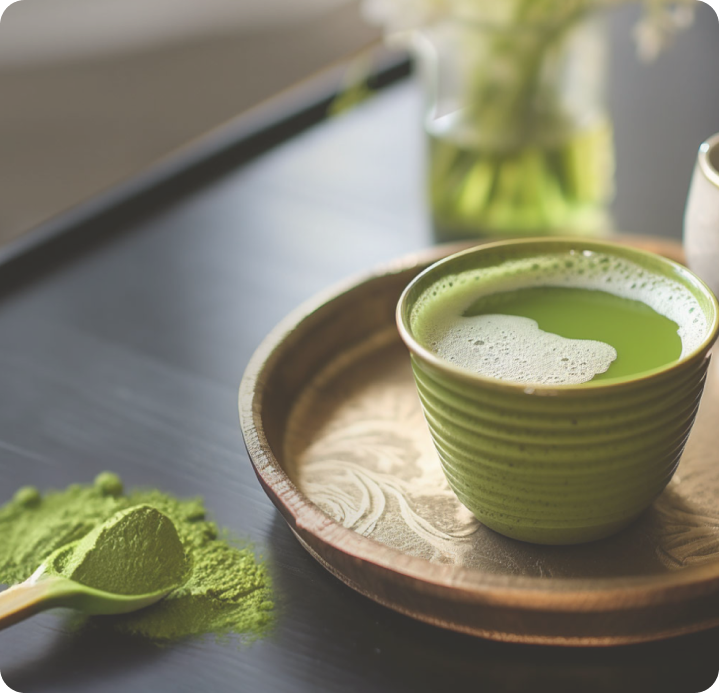

Smarte Power aus L-Theanin und Koffein
L-theanine may have a stress-reducing effect and improve focus . According to a recent meta-study, caffeine could enhance this effect. In test subjects, the combination improved reaction time, among other things.⁷
Another advantage of matcha: The body absorbs caffeine from green tea preparations more slowly and benefits from its effects for a longer period .
Tip: Psst, Mr. Broccoli has revealed his favorite matcha recipes to us.
4. Psychische Aspekte: Tipps gegen mentale Erschöpfung
Besides physical causes, there can also be psychological reasons for feeling tired. For example, a lack of motivation can feel like extreme fatigue. Sleeping in and drinking matcha only help to a limited extent. Here's what you can do instead:
Mental check-in: Listen to your body and find out whether you're more physically exhausted or mentally drained. Such a check-in is a good way to explore the causes of your fatigue and take appropriate countermeasures.
Mental mapping : What exactly is weighing on you? The future? Performance pressure at work? Or, on the contrary, are you lacking motivating challenges? Take five minutes and write down your thoughts. This won't solve your problems, but it will help your brain process your worries more effectively.⁸
Mini-motivation: If you're lacking motivation, the 2-minute rule can help: Find a small task you can complete in two minutes. This will reward you with a sense of accomplishment and a dose of dopamine. Perhaps a WhatsApp message has been waiting for your reply for days?⁹
Morning ritual: Start your day with a fixed routine that gives you structure – people with morning rituals feel more focused and less stressed. For example, write down three things you are grateful for.¹⁰
Mindfulness moment: Take a few minutes in the morning or at the office for one of the breathing techniques from the beginning or a short mindfulness exercise. This can improve concentration and help you out of a mental energy slump.
Micro-breaks: Take a conscious two-minute break every 60 to 90 minutes to avoid mental fatigue.¹¹
Music as an energy booster: You can read how this works in the next section.
5. Musik: Tanz die Müdigkeit weg
On a bad day, only your favorite song can save you? There are good reasons for this: The tempo of the music, i.e., the beats per minute (BPM), influences your heart rate: Fast music accelerates your heartbeat, while slow music slows it down and can have a relaxing effect.¹² Music activates the reward system in the brain. This means that your favorite music releases the happiness hormone dopamine.¹³
Your soundtrack for a quick energy boost
Rock, electronic, and rap music with a tempo of around 135 to 160 BPM are well suited to dispel fatigue. However, a Harvard study emphasizes that the best music is the music you personally enjoy.¹⁴Incidentally, people tend to prefer music whose tempo is similar to their current heart rate. If your focus is on feeling good, there are various apps that can help you find music that is on your “wavelength.”


6. Light and hormones: How sunlight drives you
On sunny days, many things are easier than on grey, rainy days, because the sunlight signals: Hey, it's time to be active!
Among other things, sunlight stimulates the production of the "wakefulness hormone" cortisol and reduces the production of the sleep hormone melatonin . At the same time, serotonin and dopamine , which are important for motivation, are released. Too little daylight, on the other hand, can be tiring. This is one of the reasons why some people develop winter depression during the darker months.
A walk in the fresh air clears your mind and helps your body cope with fatigue. This is especially important in autumn. Natural light is significantly more intense than office light , even on cloudy days. 16 And if the sun does shine and the colorful leaves glow brightly, a good mood is practically guaranteed.
Anzeige
- Specially developed for the immune system and energy balance
- From natural raw material sources: OPC from grape seed extract with vitamin C
- From 3 essential amino acids: glutamic acid, cysteine, and glycine
- No fillers or flavorings
- Developed with doctors and experts Delicious taste and easy to dose
- Vegan and vegetarian, free from lactose and gluten

7. Power-Posing: Körperhaltung und Bewegung für mehr Energie
We always say it: movement is essential for your well-being . You already know that, of course. But did you also know that your posture can influence how you feel? An upright and confident posture, so-called power posing, can improve mood and self-esteem .¹⁷
Even more effective are short movement breaks in everyday life.¹⁸ Take a 5-minute break every two hours and treat yourself to a longer movement break in the afternoon: Even ten minutes of walking, climbing stairs, or stretching can help improve concentration, get your circulation going, and make you feel more alert.¹⁹
8. Mini Nutrition Hacks: Eat Yourself Fitter
If you're constantly tired and lethargic, you might be lacking important nutrients and vitamins . The following nutrient hacks can help you get back on track.
Vitamine, Nährstoffe und Pflanzenstoffe: Was hilft gegen Müdigkeit?
If you're constantly tired and lethargic, you might be lacking important nutrients and vitamins. The following nutrient hacks can help you get back on track.
- B and C vitamins for fatigue: B vitamins, such as vitamin B6 and vitamin B12, are essential for your cells to function normally and produce energy. A deficiency can lead to tiredness and lack of motivation – especially for those following a vegan diet. Vitamin C can also help reduce fatigue.
- Magnesium for more energy: Magnesium is important for muscle function. A deficiency can lead to feelings of exhaustion or weakness.
- Ashwagandha during a rest period: Ashwagandha, also known as winter cherry, is said to help relieve stress. Some people take small amounts to naturally unwind.
- Coenzyme Q10 , polyphenols and resveratrol as energy boosters: These substances support the mitochondria in energy production.
Our guides to vitamins and micronutrients will help you provide your body with what it needs.
Tips for combating fatigue: What helps immediately?
For a quick energy boost, try dextrose, a teaspoon of honey, or a few dates – they provide the brain with immediate glucose and improve concentration in the short term.²²
Or you could treat yourself to a slice of apple with some peanut butter or a few nuts. The combination of carbohydrates and protein or healthy fats stabilizes blood sugar and keeps you awake throughout the afternoon.²³
Another source of quick energy is MCT oil. It provides special fatty acids that the body can convert into energy particularly quickly.²⁴
9. Fluidity: Gets you back into the flow
Drink water regularly—even a 1 to 2 percent fluid deficiency can reduce cognitive performance and make you tired. ²⁵ It's best to start the day with a large glass of water before your first matcha. For an extra energy boost or a little “energy reset” in the afternoon, you can add a pinch of salt and a little lemon. This helps your body absorb water and activates the most important electrolytes. If you're feeling particularly tired, you can resort to electrolyte powders.²⁶
10. Erholsamer Schlaf als Prävention
The best and cheapest remedy for fatigue is good sleep. Want to sleep better? These tips will help you optimize your sleep hygiene :
- A 30-minute power nap: An afternoon nap can extend your "battery life" by several hours and boost your mood.²⁷
- Magnesium: To ensure your body can go through all sleep phases undisturbed and regenerate well during deep sleep, you can support it with magnesium in the evening.²⁸
- Darkness: According to a meta-study, artificial light can increase the risk of sleep problems by 22 percent. So: turn off the lights and your phone, and lower the blinds. ²⁹
- Melatonin timing: The “sleep hormone” Melatonin regulates the sleep-wake cycle. Its production can become unbalanced when traveling. In that case, you can give it a boost and signal to your body that it's okay to get tired by using melatonin. 30
- Ideal temperature: Temperatures that are too high or too low in the bedroom can disrupt sleep cycles. Studies show that temperatures between 16 and 20 degrees Celsius are ideal for high-quality sleep. ³¹
- Well covered: A blanket helps to keep your body temperature constant, and a heavy blanket ensures that you sleep even more soundly through the night.³²
Check out our sleep blog if you're looking for more tips on achieving an optimal sleep rhythm.
Are you constantly tired despite life hacks?
However, if you constantly feel tired and lacking in energy, regardless of how balanced your diet is or how well you sleep, there could be other underlying causes besides fatigue. Get a check-up from a doctor before resorting to supplements or attempting self-treatment. A blood test can reveal whether a deficiency or illness is causing the fatigue.
Advertisement
- Tests 43 genetic variations of your 38 genes in relation to micronutrients
- Analyzes the vitamin and mineral requirements needed for your genetic profile
- Records the antioxidant requirements needed for your genetic predisposition
- Detailed evaluation of your micronutrient requirements
- Valuable tips for adjusting your diet
- Simple saliva test, can be done at home & easy to understand
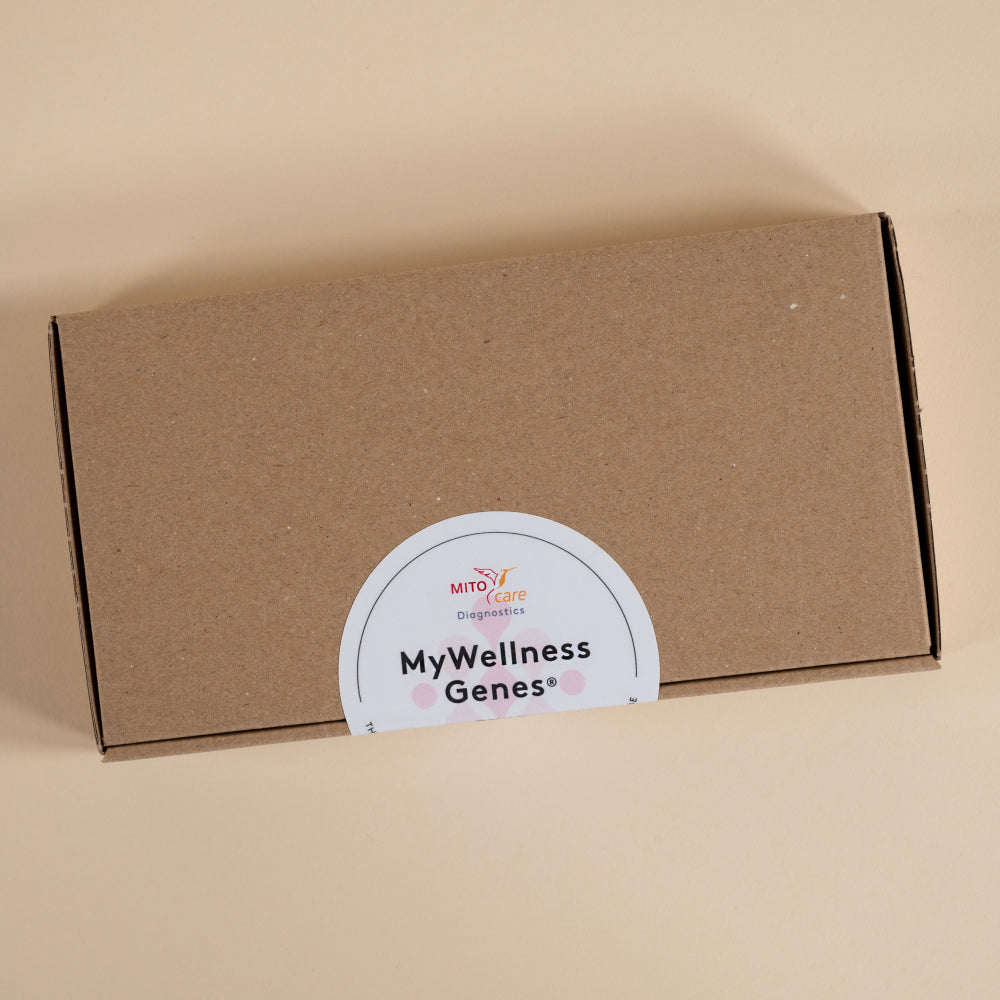
This article is based on carefully researched sources:
Sources & Bibliography
- Srámek P, Simecková M, Janský L, Savlíková J, Vybíral S. Human physiological responses to immersion into water of different temperatures. Eur J Appl Physiol. 2000;81(5):436-442. doi:10.1007/s004210050065
- Cain T, Brinsley J, Bennett H, Nelson M, Maher C, Singh B. Effects of cold-water immersion on health and wellbeing: A systematic review and meta-analysis. PLoS One. 2025;20(1):e0317615. Published 2025 Jan 29. doi:10.1371/journal.pone.0317615
- tu-dresden.de/mn/biologie/studium/studieren-an-der-fachrichtung-biologie/wissenschaftskommunikation-von-bios/bios-artikel/fact-check-cold-showers-and-health-benefits
- sciencedirect.com/science/article/abs/pii/S030698770700566X
- Balban MY, Neri E, Kogon MM, et al. Brief structured respiration practices enhance mood and reduce physiological arousal. Cell Rep Med 2023;4(1):100895. doi:10.1016/j.xcrm.2022.100895
- swr.de/leben/gesundheit/geheimnis-hinter-energydrinks-wie-beeinflussen-sie-koerper-und-gesundheit-102.html
- academic.oup.com/nutritionreviews/article/83/10/1873/8123998
- geo.de/wissen/gesundheit/schreiben-als-therapie--seelisches-leid-lindern-30176768.html
- taw.de/blog/2-minuten-fuer-mehr-produktivitaet
- uni-wuppertal.de/de/news/detail/voll-im-flow-wie-beschaeftigte-von-einer-morgenroutine-profitieren/
- Albulescu P, Macsinga I, Rusu A, Sulea C, Bodnaru A, Tulbure BT. "Give me a break!" A systematic review and meta-analysis on the efficacy of micro-breaks for increasing well-being and performance. PLoS One. 2022;17(8):e0272460. Published 2022 Aug 31. doi:10.1371/journal.pone.0272460
- frontiersin.org/journals/psychology/articles/10.3389/fpsyg.2024.1292516/full
- Yang, Z., Su, Q., Xie, J. et al. Music tempo modulates emotional states as revealed through EEG insights. Sci Rep 15, 8276 (2025).
- magazine.hms.harvard.edu/articles/how-music-resonates-brain
- uni-bamberg.de/perspsych/news/artikel/neue-publikation-und-pressemitteilung-meta-analyse-zu-power-posing/
- spektrum.de/news/uv-licht-koennen-sonnenstrahlen-autoimmunerkrankungen-heilen/2269798
- uni-bamberg.de/perspsych/news/artikel/neue-publikation-und-pressemitteilung-meta-analyse-zu-power-posing/
- bbgm.de/blog/2022/03/06/how-small-movement-breaks-promote-mental-health-in-the-office-and-home-office/
- Fischetti F, Pepe I, Greco G, et al. Ten-Minute Physical Activity Breaks Improve Attention and Executive Functions in Healthcare Workers. J Funct Morphol Kinesiol. 2024;9(2):102. Published 2024 Jun 12. doi:10.3390/jfmk9020102
- Pfnür IAH. Vitamin B12 Deficiency as the Cause. Dtsch Ärztebl Int. 2022;119(12):216. doi:10.3238/arztebl.m2022.0053
- Sim M, Hong S, Jung S, et al. Vitamin C supplementation promotes mental vitality in healthy young adults: results from a cross-sectional analysis and a randomized, double-blind, placebo-controlled trial. Your J Nutr. 2022;61(1):447-459. doi:10.1007/s00394-021-02656-3
- Kennedy DO, Scholey AB. Glucose administration, heart rate and cognitive performance: effects of increasing mental effort. Psychopharmacology (Berl). 2000;149(1):63-71. doi:10.1007/s002139900335
- sciencedirect.com/science/article/abs/pii/S003193840100676X
- healthline.com/nutrition/mct-oil-benefits
- academicmed.org/Uploads/Volume7Issue2/33.%20[4805.%20JAMP_Mohamed]%20157-162.pdf
- academicmed.org/Uploads/Volume7Issue2/33.%20%5B4805.%20JAMP_Mohamed%5D%20157-162.pdf
- Leong RLF, Lau T, Dicom AR, Teo TB, Ong JL, Chee MWL. Influence of mid-afternoon nap duration and sleep parameters on memory encoding, mood, processing speed, and vigilance. Sleep. 2023;46(4):zsad025. doi:10.1093/sleep/zsad025
- Hausenblas HA, Lynch T, Hooper S, Shrestha A, Rosendale D, Gu J. Magnesium-L-threonate improves sleep quality and daytime functioning in adults with self-reported sleep problems: A randomized controlled trial. Sleep Med X. 2024;8:100121. Published 2024 Aug 17. doi:10.1016/j.sleepx.2024.100121
- ajhonline.org/article/S1054-139X(23)00420-2/fulltext
- Zisapel N. New perspectives on the role of melatonin in human sleep, circadian rhythms and their regulation. Br J Pharmacol. 2018;175(16):3190-3199. doi:10.1111/bph.14116
- jphysiolanthropol.biomedcentral.com/articles/10.1186/1880-6805-31-14
- Yu J, Du J, Yang Z, et al. Effect of weighted blankets on sleep quality among adults with insomnia: a pilot randomized controlled trial. BMC Psychiatry. 2024;24(1):765. Published 2024 Nov 5. doi:10.1186/s12888-024-06218-9




